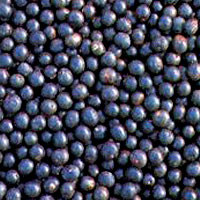Açaí
 © Steven Foster
© Steven FosterHow It Works
Açaí is one of nature’s richest sources of anthocyanins—a type of bioflavonoid. Anthocyanins make up the purple, red, and blue-black pigments found within certain berries, fruits, plants, and flowers. The fruit of açaí also contains protein, fiber, enzymes, vitamin E, amino acids, minerals (potassium, calcium, magnesium, phosphorus, copper, manganese, zinc, and boron), phytosterols, and beneficial fatty acids.
How to Use It
Frozen pulp: approximately 100 grams (3.5 ounces) per day is recommended, although there is no accepted standard. Brazilians commonly drink up to a liter (34 ounces) of açaí juice per day.
Powder: 1 ounce of powder mixed with 10 to 12 ounces of water, once or twice a day.
Freeze-dried açaí in capsules or tablets is sometimes recommended at 1 to 2 grams per day.
Copyright © 2026 TraceGains, Inc. All rights reserved.
Learn more about TraceGains, the company.
The information presented by TraceGains is for informational purposes only. It is based on scientific studies (human, animal, or in vitro), clinical experience, or traditional usage as cited in each article. The results reported may not necessarily occur in all individuals. Self-treatment is not recommended for life-threatening conditions that require medical treatment under a doctor's care. For many of the conditions discussed, treatment with prescription or over the counter medication is also available. Consult your doctor, practitioner, and/or pharmacist for any health problem and before using any supplements or before making any changes in prescribed medications. Information expires December 2026.








